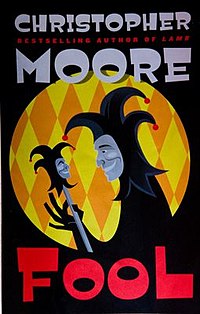
The Tragedy of King Lear, often shortened to King Lear, is a tragedy written by William Shakespeare. It is loosely based on the mythological Leir of Britain. King Lear, in preparation for his old age, divides his power and land between his daughters Goneril and Regan, who pay homage to gain favour, feigning love. The King's third daughter, Cordelia, is offered a third of his kingdom also, but refuses to be insincere in her praise and affection. She instead offers the respect of a daughter and is disowned by Lear who seeks flattery. Regan and Goneril subsequently break promises to host Lear and his entourage, so he opts to become homeless and destitute, and goes insane. The French King married to Cordelia then invades Britain to restore order and Lear's rule. In a subplot, Edmund, the illegitimate son of Gloucester, betrays his brother and father. Tragically, Lear, Cordelia and several other main characters die.

Leir was a legendary king of the Britons whose story was recounted by Geoffrey of Monmouth in his pseudohistorical 12th-century History of the Kings of Britain. According to Geoffrey's genealogy of the British dynasty, Leir reigned around the 8th century BC, around the time of the founding of Rome. The story was modified and retold by William Shakespeare in his Jacobean tragedy King Lear.
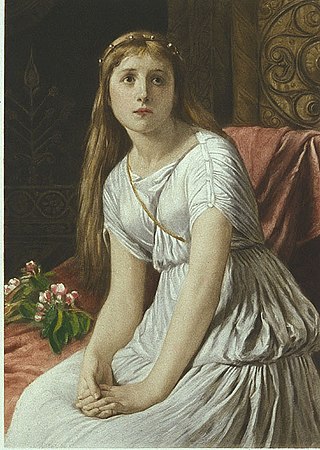
Cordelia was a legendary Queen of the Britons, as recounted by Geoffrey of Monmouth. She came to power in 855BC.

A Thousand Acres is a 1991 novel by American author Jane Smiley. It won the 1992 Pulitzer Prize for Fiction, the National Book Critics Circle Award for fiction in 1991 and was adapted to a 1997 film of the same name. It was premiered as an opera by the Des Moines Metro Opera during their 2022 season.

King of Texas is a 2002 American Western television film based on William Shakespeare's King Lear and directed by Uli Edel.
King Lear (1983) is a video production of William Shakespeare's 1606 play of the same name, directed by Michael Elliott. It was broadcast in 1983 in the UK and in 1984 in the US.

"The Foretelling" is the first episode of the BBC sitcom The Black Adder, the first series of the long-running comedy programme Blackadder. It marks Rowan Atkinson's debut as the character Edmund Blackadder, and is the first appearance of the recurring characters Baldrick and Percy. The comedy actor Peter Cook guest stars as King Richard III.
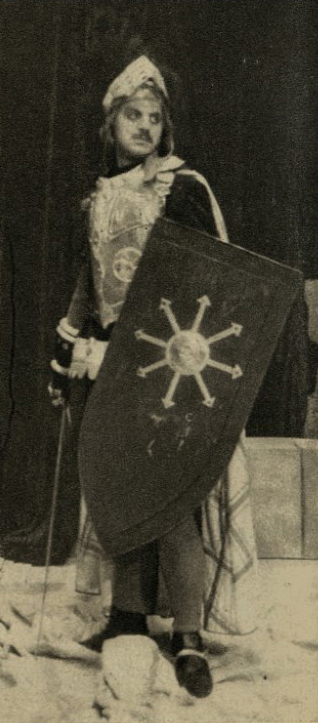
Edmund is a fictional character and the main antagonist in William Shakespeare's King Lear. He is the illegitimate son of the Earl of Gloucester, and the younger brother of Edgar, the Earl's legitimate son. In the first act of the play, Edmund resolves to get rid of his brother, then his father, and become Earl in his own right. He later flirts with both Goneril and Regan and attempts to play them off against each other. His mother died during childbirth.
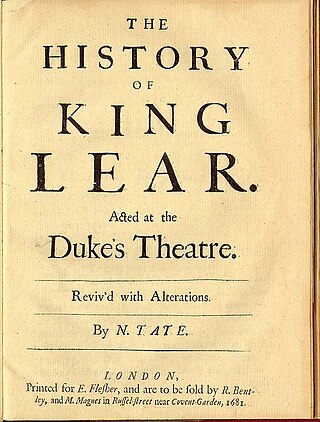
The History of King Lear is an adaptation by Nahum Tate of William Shakespeare's King Lear. It first appeared in 1681, some seventy-five years after Shakespeare's version, and is believed to have replaced Shakespeare's version on the English stage in whole or in part until 1838. While Tate's version proved extremely popular on the stage and received critical acclaim, the response of literary critics has generally been negative.

King Lear is a 1971 British film adaptation of the Shakespeare play directed by Peter Brook and starring Paul Scofield. Filmed in stark black-and-white, the film was inspired by the absurdist theatre of playwrights such as Samuel Beckett and upon release was noted for its bleak tone and wintry atmosphere.
Women in Shakespeare is a topic within the especially general discussion of Shakespeare's dramatic and poetic works. Main characters such as Dark Lady of the sonnets have elicited a substantial amount of criticism, which received added impetus during the second-wave feminism of the 1960s. A considerable number of book-length studies and academic articles investigate the topic, and several moons of Uranus are named after women in Shakespeare.

King Lear is a 1971 Soviet drama film directed by Grigori Kozintsev, based on William Shakespeare's play King Lear. The film uses Boris Pasternak's translation of the play, while the Fool's songs are translated by Samuil Marshak. It was Kozintsev's last completed film.
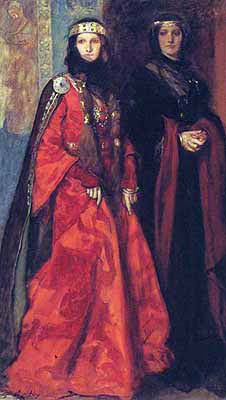
Regan is a fictional character in William Shakespeare's tragic play King Lear, named after a King of the Britons recorded by the medieval scribe Geoffrey of Monmouth.

Cordelia is a fictional character in William Shakespeare's tragic play King Lear. Cordelia is the youngest of King Lear's three daughters and his favorite. After her elderly father offers her the opportunity to profess her love to him in return for one-third of the land in his kingdom, she replies that she loves him "according to her bond" and she is punished for the majority of the play.

Goneril is a character in William Shakespeare's tragic play King Lear (1605). She is the eldest of King Lear's three daughters. Along with her sister Regan, Goneril is considered a villain, obsessed with power and overthrowing her elderly father as ruler of the kingdom of Britain.
King Lear is a 1999 adaptation of William Shakespeare's play of the same name. The film stars Brian Blessed in the title role. Apart from Peter Brook's King Lear in 1971, it is the only other feature-length film adaptation to preserve Shakespeare's verse. Yvonne Griggs, in Shakespeare's King Lear: A close study of the relationship between text and film (2009), characterised it as "a very stilted costume drama".

King Lear is a 1953 live television adaptation of the Shakespeare play staged by Peter Brook and starring Orson Welles. Preserved on kinescope, it aired October 18, 1953, as part of the CBS television series Omnibus, hosted by Alistair Cooke. The cast includes Micheál Mac Liammóir and Alan Badel.

Kuningas Lear is an opera in two acts by Aulis Sallinen, with a libretto by the composer, based on the play by William Shakespeare and premiered in 2000; it was Sallinen's sixth opera.

King Lear is a 1916 silent film based on the 1606 play, directed by Ernest C. Warde and starring his father, the noted stage actor Frederick Warde. The film is one of a spate of Shakespearean films produced at the time to coincide with the 300th anniversary celebrations of William Shakespeare's death.

King Lear is a 2018 British-American television film directed by Richard Eyre. An adaptation of the play of the same name by William Shakespeare, cut to just 115 minutes, it was broadcast on BBC Two on 28 May 2018. Starring Anthony Hopkins as the title character, the abridged adaptation is set in a highly militarised version of 21st-century London and depicts the tragedy that follows when the sovereign King Lear announces the end of his reign and the division of his kingdom among his three daughters. The adaptation was met with positive reviews, which commended its acting, and many singled out Hopkins for his performance in the title role.
